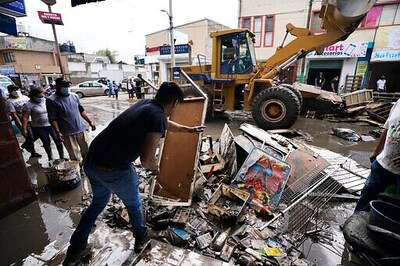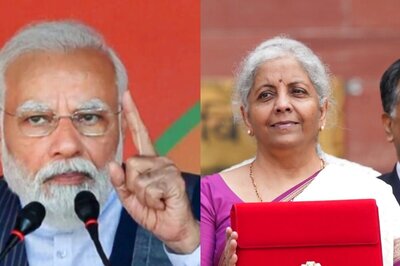
views
Tripoli: At least two people were killed in clashes between security forces and demonstrators in the Libyan town of Bayda, east of Benghazi city, as activists planned major anti-government protests throughout the country Thursday.
The deaths come as hundreds of protesters on Wednesday reportedly torched police outposts in the eastern city of Bayda while chanting: "People want the end of the regime", Al Jazeera reported.
At least 38 people, including 10 security officials, were injured in the fighting.
Anti-government activists have vowed to hold the biggest rallies Thursday in what they call a "Day of Rage", the report said.
"All the people of Bayda are out on the streets," said 25-year-old Rabie al-Messrati, adding that he had been arrested after spreading a call for protests on Facebook.
Inspired by popular and successful uprisings in neighbouring Tunisia and Egypt, Libyan protesters are seeking an end to Muammar Gaddafi's 41-year rule, one of the longest ruling and most repressive leaders in the world.
In the southern city of Zentan, 120 km south of the capital Tripoli, hundreds of people marched through the streets and set fire to security headquarters and a police station, then set up tents in the heart of the town, as a wave of unrest spread south and westwards across the country.
Chants including "No god but Allah, Muammar is the enemy of Allah," can be heard on videos of demonstrations uploaded on YouTube. Independent confirmation was not possible as Gaddafi's government keeps tight control over the movements of media personnel.
Social media sites, which became the tools of choice across the Middle East, were reportedly blocked for several hours through the afternoon, but access was restored in the evening.
Al Jazeera is understood to have been taken off the state-owned cable TV network, but is still reportedly available on satellite networks.
The rare protests in Libya reportedly began after relatives of those killed in a prison massacre about 15 years ago took to the streets. They were joined by scores of supporters.
The relatives were said to have been angered by the detention of Fathi Terbil, human rights lawyer and official spokesman of the victims' families, who was arrested by the Libyan security forces for no apparent reason.
However, Terbil was later released, according to reports.
Twelve-hundred prisoners were killed in the Abu Slim prison massacre June 29, 1996, after they had objected to their inhumane conditions inside the prison.
The US Wednesday said it urged Libya to meet the aspirations of its people.
"Countries across the region have the same kind of challenge in terms of the demographics, the aspirations of their people, the need for reform," State Department spokesman Philip Crowley said.
"And we encourage these countries to take specific actions that address the aspirations and the needs and hopes of their people. Libya certainly would be in that same category."
Relations between Libya and the US have seesawed over the last 30 years. The ties were restored in 2004 after Libya renounced its quest for weapons of mass destruction.
Gaddafi's government sought to allay further unrest by proposing the doubling of government employees' salaries and releasing 110 members of the armed and outlawed Libyan Islamic Fighting Group which opposes him -- tactics similar to those adopted by other Arab regimes in the recent wave of protests.
The demonstrations in Tunisia and Egypt ultimately toppled the presidents in both countries.


















Comments
0 comment